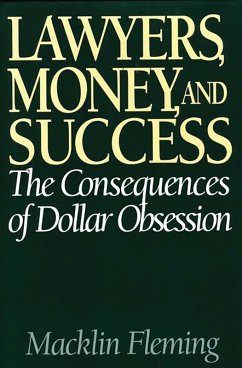Retired Justice Macklin Fleming argues that in its quest for money, the legal profession has lost sight of its true tasks and responsibilities, with the result that the profession is rife with client dissatisfaction, public distrust, and individual lawyer discontent. Money is now the measure of success, he says, and honesty has been diluted, while fiduciary responsibility has eroded. Fleming elaborates his case with unusual rigor. In the quest for the brass ring of financial success, corner-cutting, absence of candor, and distortions of fact have become increasingly tolerated, to the extent that clients, the public, and lawyers themselves no longer have a sense of trust and confidence in the legal profession. Obviously, changes are needed, and unless they come from within the firms themselves, lawyers can be sure that they will come from individuals, agencies, and organizations outside these firms. Attorneys in all kinds of practices, their clients in all sectors of the economy, and academics concerned with the practice of law in all its dimensions will find Fleming's book informative, challenging, and certainly provocative reading. Fleming starts by examining what he sees as a paradox: a large increase in lawyers' fees despite a fourfold increase in lawyer numbers and a threefold increase in their proportion of the general population. What happened to the law of supply and demand? he asks. After tracing the history of the large corporate law firm and its dominance within the profession, he shows how cost-effectiveness within large firms has declined while at the same time what he calls the magic of the emperor's new clothes has suspended the law of supply and demand. He discusses excessive legal fees, their resistance to client and court controls, and relates his discussion to the present pervasive distrust of lawyers among the public. Fleming outlines the four existing challenges to business-as-usual by lawyers and law firms, and then ventures his own analysis of the needed future changes in law firms. These include professional law firm management under a less archaic structure, effective integrity and quality controls, cost-controlled delivery of legal services, and increased job satisfaction for its working lawyers.
Bitte wählen Sie Ihr Anliegen aus.
Rechnungen
Retourenschein anfordern
Bestellstatus
Storno









